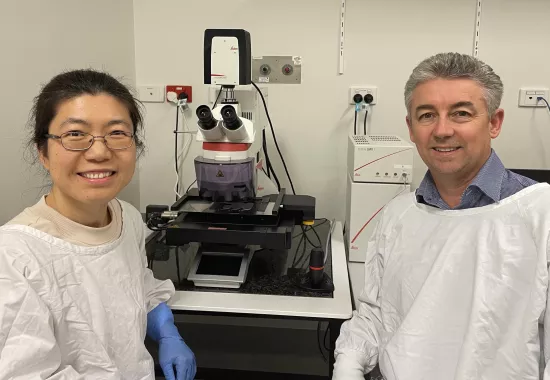Impressive new infrastructure at the Kolling Institute is set to drive progress with our research into cancer and neuroscience.
The equipment includes a digital spatial profiling system, which is regarded as one of the most exciting technological advances globally in the investigation of tissues.
The $525,000 instrument has been made possible following a LIEF grant through the Australian Research Council to Professor Mark Molloy. Co-funding was provided by the University of Sydney and Macquarie University.
A new laser capture microscope has been installed at a cost of $250,000. This microscope allows researchers to capture specific tissue regions for sequencing and analysis. It was funded by the Ian Potter Foundation, the Kolling and the University of Sydney.
Professor Mark Molloy, Lawrence Penn Chair of Bowel Cancer Research has welcomed the new technology, saying it will allow researchers to profile gene and protein expression in specific cells of complex tissues such as tumours, brain tissue, liver and kidney cells.
“This will in turn, provide valuable new information about how cells function in disease and health,” he said.
“It’s wonderful to have this equipment which will help us understand how disease develops.
“It will also help us identify new biomarkers indicating which patients are likely to respond to some treatments.
“This is important as we continue to see a rise in the number people diagnosed with some cancers.
“For example, we are seeing an increase in those under 50 with early onset colorectal cancer, and by 2030, we expect one in 10 cases will be under 50 years old.
“This is a concerning trend, with no clear explanation for the rise in these cases.
“A decade ago there was little attention given to this condition, but we now have evidence of increased diagnosis in young people, who sadly, often present with aggressive, advanced disease where treatment options are more limited.
“Colorectal cancer is certainly no longer only a disease of the aged.”
Bowel cancer research fellow Dr Jun Li has welcomed the opportunity to utilise the new equipment.
“It’s encouraging to have access to these new platforms as it’s allowing us to do research that we simply couldn’t do before,” she said.
“This we hope, will lead to a greater understanding of disease, prevention and improved treatment options.”
The equipment is open to all researchers at NSLHD and the University of Sydney through the core research facilities model.
